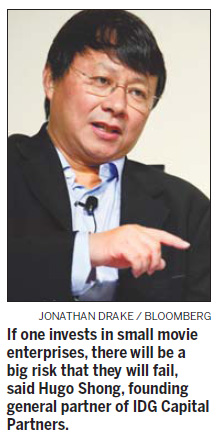Business
Industry on a roll with financial guru
By Shen Jingting (China Daily)
Updated: 2010-12-06 07:31
 |
Large Medium Small |

BEIJING - Hugo Shong, founding general partner of IDG Capital Partners, said he did not expect such success for Under the Hawthorn Tree, a romantic film set in the 1960s and 70s and made by Zhang Yimou.
This is not a typical Zhang Yimou movie. No stunning colors, no stellar cast. Instead, it tells a poignant tale of doomed young love in a plain and quiet way.
Set against the "cultural revolution" (1966-1976), the film depicts how two youngsters - Jingqiu and Laosan - try hard to maintain their love despite a huge gap in their social status. It has a sad ending, with Laosan, the son of a general, dying in a hospital from leukemia.
"My college classmate called me at midnight, sobbing hard, and thanked me for giving him a chance to cry himself out," Hong recalled.
He said he had received a wave of text messages and calls from people he knew and some he didn't, after the movie was shown on screens in China in September, praising him for making such a good film.
"They said the movie touched their heart strings because it is such an innocent love story. It also pulled them back to the memory of their youth when the country was in a miserable state," Hong said.
This is not the first movie that Hong, who is described as an investment guru in China's Internet industry, has invested in. Although he achieved great success by making investments in Baidu, Tencent and Ctrip, he has only just started making money from movies.
"Box office receipts for Under the Hawthorn Tree have reached 160 million yuan ($24.24 million), setting a record for Chinese literary films," he said, adding a new movie invested in by IDG Media Fund will hit the screens next year.
"I feel very optimistic about the Chinese movie market. If one film doesn't make money, you can invest in 10 films. If one out of 10 becomes a blockbuster, you will not lose money," Hong said.
Hong's IDG Media Fund has already invested in five Chinese movies since 2008, including Hutong Days, Examination 1977 and Future X-cops, according to China Venture Group, a leading investment research firm in China.
In addition, a few of other venture capital companies, such as Sequoia Capital China, Matrix Partners China and CDH Investments, have started to invest in the Chinese movie industry, albeit in a very small way, said Feng Po, an analyst with China Venture Group.
"Famous directors or movie stars usually are contracted to just a few movie companies. The limited resource intensifies competition," Feng said, explaining why venture capital firms were hesitant to invest in Chinese films, or movie companies.
If one invests in small movie enterprises, there will be a big risk that they will fail, he said.
Richard Ji, managing director of Morgan Stanley Asia Limited, said the movie industry was among a few industries in China that benefited from the global financial crisis.
"The movie industry is an industry that creates happiness for people. When the economic environment is down, the demand for happy feelings is strong," Ji said.
In 2009, the Chinese movie industry experienced accelerated growth by realizing a year-on-year increase in income of 40 percent. From 2006 to 2008, the growth rate was between 25 percent and 30 percent, according to Ji.
Morgan Stanley estimated a mere 4 to 5 percent of Chinese people go to see a movie every year. As happiness is an eternal pursuit for mankind, the Chinese movie industry is full of opportunities in the near future, Ji said.